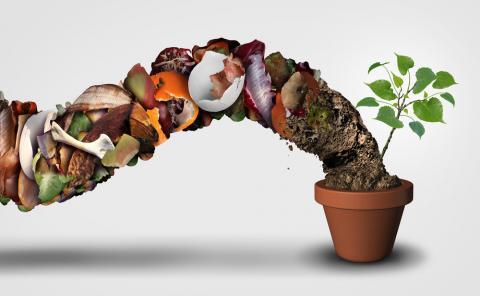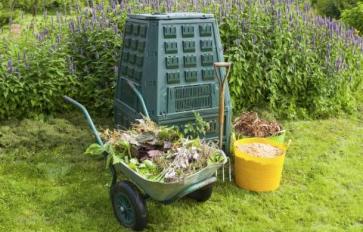
Composting is a technique which involves decomposing plant matter into rich, productive soil. It is an essential method for anyone who chooses to practice organic gardening. Successful composting requires more than just placing organic matter into large piles. To get the most out of your compost, check out these 9 useful tips!
1. Ensure adequate moisture.
The moisture for your compost needs to be just right so that your compost is a good environment for the living organisms that break it down. If your compost is too dry, you can water it or add in more green plant matter. The more green material you add in, the less you will have to water it, but go easy on it because too much will cause your compost to be mushy.
2. Keep a good carbon-to-nitrogen ratio.
Successful composting requires just the right amount of carbon and nitrogen mixture. The nitrogen can be raised by using such things as straw, sawdust, and wood chips. The carbon can be raised by adding green plant material like grass clippings, leaves, and animal manure. Too much brown material will take too long to break down and too much green will cause mildew and odors. A 30:1 carbon-to-nitrogen ratio is considered to be a good number when it comes to green-to-brown ratio. Here is a great chart provided by Planet Natural Research Center which provides different compostable materials and their estimated carbon-to-nitrogen ratios.
3. Avoid composting animal products.
Try to avoid placing animal products such as animal fat, bones, and meat in your garden compost as these often attract critters and flies. Also, these types of materials can take too long to break down. I recommend animal products have their own separate compost or be placed in a covered worm compost.
4. Maintain adequate pH levels.
Cornell University recommends composting pH levels to remain between 5.5 and 8 for lignin and cellulose in plants to properly breakdown. You can lower the acidity in your compost if necessary by turning your compost frequently. Test the pH levels using a soil testing kit or pH strips, which work best when the soil is moist.
5. Keep a good temperature range.
Check the temperature of your compost by using a compost thermometer and placing it in the core of the pile. Compost decomposes quickly at temperatures ranging from 120-160˚F. Decomposition will occur at lower temperatures, but it takes much longer.
6. Use tea leaves and coffee grounds.
Instead of throwing your tea leaves or coffee grounds away, put them in your compost! Adding tea leaves to your compost can help increase the nitrogen, phosphorus, potassium, and other trace minerals. Coffee is great for increasing the nutrients, acidic levels, and nitrogen.
7. Keep harsh, synthetic chemicals out.
If possible, try to avoid plants that contain harsh chemicals, such as the ones found in commercial pesticides. This can negatively affect your composting process in many ways, so be sure to double check that you are placing only organic matter into your compost.
8. Turn compost frequently.
Proper aeration creates airflow, which is vital for the bacteria to break down the organic matter. It is important to frequently turn your compost as it matures, especially if it starts to smell or become too moist. To accurately turn your compost, start by turning the dry material with a shovel or pitchfork from the outer edges of the pile into the center. For better airflow, be sure to break up the large clumps.
9. Create more than one pile.
For those who have a lot of material to compost, having more than one compost pile could be beneficial. A popular method for compost is often forming 3 piles of 3x3 feet each because it is easier to maintain as well as turn. You can start by forming one pile first and then when it reaches 3 feet, you can start another one beside it.
Adding compost is a great way to improve your garden’s soil, and following these tips will help you to create good quality compost.








